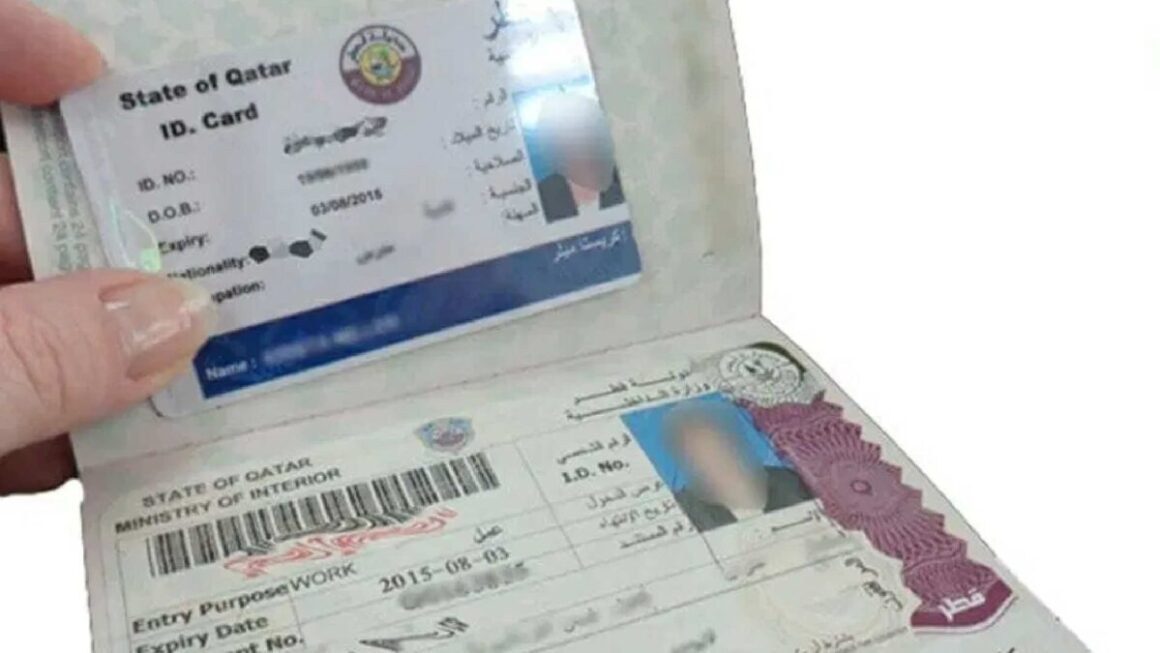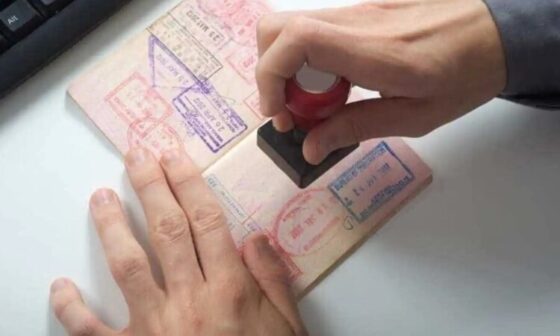Landing a job overseas often feels like stepping into a new chapter of life filled with opportunities, and Qatar has become a beacon for many Nigerian professionals. With its booming economy, tax-free salaries, and global work environment, a 2-year work visa in Qatar is an ideal option for those seeking better prospects. But understanding the cost of a Qatar 2-year work visa for Nigeria is essential before you dive in.
What Is a Qatar 2-Year Work Visa?
A Qatar 2-year work visa is a government-issued employment permit that allows foreign workers, including Nigerians, to legally reside and work in Qatar for two years. This visa is typically sponsored by an employer, meaning that the hiring company facilitates and oversees the application process. The 2-year duration provides job security and an opportunity to establish oneself in Qatar’s competitive job market.
Key Features of the Qatar 2-Year Work Visa
- Valid for Two Years – Holders can live and work in Qatar for 24 months before renewal.
- Employer-Sponsored – Companies are responsible for visa processing, medical tests, and work permits.
- Linked to the Employer – Switching jobs may require approval from the current employer.
- Renewable – Can be extended beyond two years if the employer offers continued employment.
- Access to Residency Benefits – Workers can rent apartments, open bank accounts, and access healthcare.
Key Benefits of a Qatar 2-Year Work Visa
#1. Tax-Free Income
One of the biggest attractions of working in Qatar is its zero personal income tax policy. Unlike many countries where a portion of your salary goes to taxes, in Qatar, you take home your full earnings. This makes it one of the most financially rewarding work destinations for Nigerians.
Example: If your salary is QAR 6,000 (~₦1.3 million) per month, you keep 100% of it.
#2. High Demand for Skilled Labor
Qatar is constantly hiring foreign workers due to its growing economy. Some of the most in-demand sectors include:
- Construction & Engineering – Due to ongoing infrastructure projects (e.g., stadiums, roads, and hotels).
- Healthcare – Demand for doctors, nurses, and medical staff is increasing.
- Hospitality & Tourism – With Qatar emerging as a travel hub, there’s a growing need for hotel and service workers.
- IT & Telecommunications – The country is investing in digital transformation and cybersecurity.
#3. Family Sponsorship Opportunities
Certain companies in Qatar offer family sponsorship benefits, allowing workers to bring their spouse and children.
Requirements for Family Sponsorship:
- Minimum monthly salary of QAR 10,000 (~₦2.2 million)
- Proof of accommodation in Qatar
- Attested marriage and birth certificates for dependents
#4. Additional Employment Benefits
Depending on the company and job sector, many employers provide extra perks, such as:
- Free Housing or Housing Allowance – Many employers offer accommodation or a rent allowance.
- Medical Insurance – Free or subsidized healthcare benefits.
- Transportation Allowance – Some companies provide company cars or transport allowances.
- Flight Tickets – Some contracts include annual return flights for employees to visit home.
Who Can Apply for a Qatar 2-Year Work Visa?
The Qatar 2-year work visa is open to both skilled and unskilled workers. However, requirements vary depending on the industry.
General Eligibility Requirements:
- Valid Nigerian passport (with at least 6 months validity).
- Employment contract from a Qatari company.
- Medical clearance certificate (test done in Nigeria before departure and again in Qatar).
- Police clearance certificate from the Nigerian authorities.
- Relevant work experience or certifications (varies by job sector).
Jobs That Require Certifications
Some professions in Qatar require specific certifications. For example:
Advertisements
- Healthcare Workers: Must have QCHP licensing (Qatar Council for Healthcare Practitioners).
- Construction & Engineering Workers: Some companies may require certifications in safety and engineering skills.
- IT Professionals: Having international IT certifications (e.g., CCNA, AWS, or PMP) boosts job chances.
How Much Does a Qatar 2-Year Work Visa Cost in Nigeria?
The cost of obtaining a Qatar 2-year work visa in Nigeria varies based on several factors, such as whether your employer covers the expenses or if you are responsible for certain costs. Some companies offer full visa sponsorship, while others may require candidates to handle initial processing fees before reimbursement.
Breakdown of Costs for a Qatar 2-Year Work Visa
| Expense | Estimated Cost in Naira (₦) | Equivalent in Qatari Riyal (QAR) |
| Visa Application Fee | ₦15,000–₦30,000 | QAR 150–300 |
| Medical Examination in Nigeria | ₦25,000–₦50,000 | QAR 250–500 |
| Police Clearance Certificate | ₦5,000–₦10,000 | QAR 50–100 |
| Qatar Visa Processing Fee | ₦60,000–₦120,000 | QAR 500–1,000 |
| Flight Ticket (One-Way to Qatar) | ₦300,000–₦450,000 | QAR 2,500–3,750 |
| Recruitment Agency Fees (if any) | ₦50,000–₦150,000 | QAR 400–1,250 (varies per agency) |
Estimated Total Cost: ₦400,000–₦800,000, excluding any additional costs like extra documentation, notarization, or travel expenses.
Additional Fees to Consider
🔹 Document Attestation
- Some employers require certificates (degrees, training, etc.) to be attested by the Qatari Embassy in Nigeria.
- Cost: ₦20,000–₦50,000 per document.
🔹 Accommodation in Qatar (If Not Provided by Employer)
- If the employer does not offer accommodation, you may need to arrange temporary housing.
- Cost: Renting a shared apartment in Doha can range from QAR 1,000–QAR 3,000 per month (~₦120,000–₦360,000).
🔹 Qatar ID & Work Permit Fees
- Once in Qatar, the Qatar ID (QID) and work permit processing is mandatory.
- This is usually covered by the employer, but self-sponsored workers may pay QAR 500–QAR 1,000 (~₦60,000–₦120,000).
Who Pays for These Fees?
✔ Employer-Sponsored Visa – Most reputable companies in Qatar pay for visa processing, medicals, work permits, and flights. The worker only needs to cover basic documentation fees (e.g., police clearance).
Advertisements
✔ Self-Sponsored Visa – Some job seekers arrange their visas independently, covering all costs. They apply for a freelancer visa or business visa and later convert it to a work visa after securing a job.
Step-by-Step Process for Obtaining a Qatar 2-Year Work Visa
#1. Secure a Job Offer
Begin by applying through reputable job portals like LinkedIn, GulfTalent, or Qatar Living. Ensure your employer provides a formal offer letter outlining job responsibilities and benefits.
#2. Prepare Required Documents
- Valid Nigerian passport (minimum 6 months validity).
- Passport-sized photographs (white background).
- Educational and professional certificates attested by the Qatari Embassy in Nigeria.
- Medical and police clearance certificates.
#3. Employer Applies for the Visa
Your employer initiates the work visa process through the Qatari Ministry of Labour.
#4. Undergo a Medical Test
Upon arrival in Qatar, you’ll undergo an additional medical test at a government-approved facility.
#5. Receive Your Qatar ID
The ID card is mandatory for residency and work, issued after medical and biometric clearance.
Tips for First-Time Applicants
Applying for a Qatar 2-year work visa for the first time can be overwhelming, but proper preparation can make the process smoother. Here are essential tips for first-time applicants:
#1. Research Your Employer
✅ Verify the company’s legitimacy – Many job seekers fall victim to fake recruitment agencies promising high-paying jobs.
✅ Check the employer’s website – Ensure they have a professional website, business registration, and an official email domain.
✅ Confirm visa sponsorship – Ask whether the employer covers visa processing fees, flights, accommodation, and medical insurance.
✅ Look for reviews – Check sites like Glassdoor, LinkedIn, or Qatar’s Ministry of Labour website to confirm the employer’s credibility.
#2. Start Early & Plan Ahead
✅ Visa processing can take 2–4 weeks, but additional steps like medical tests and police clearance may extend the timeline.
✅ Book appointments early – Medical exams and document attestation can take extra time.
✅ Have backup funds – Even if your employer sponsors you, some upfront costs (like medicals and police clearance) may need to be covered initially.
#3. Stay Organized & Keep Copies of Everything
✅ Maintain both digital and physical copies of your passport, job offer, visa documents, and medical test results.
✅ Keep a dedicated email folder – Store all official communication with your employer and embassy in one place.
✅ Save emergency contact details – Write down numbers for your employer, embassy, and emergency services in Qatar.
Challenges and How to Overcome Them
#1. Cultural Adjustment
Challenge: Adjusting to Qatar’s cultural norms, laws, and work expectations can be difficult.
Solution:
- Learn about Qatari customs and workplace etiquette before arriving.
- Respect dress codes, prayer times, and public behaviour laws (e.g., avoid public displays of affection).
- Join Nigerian expat communities in Qatar for social support and networking.
#2. Language Barriers
Challenge: While English is widely spoken, Arabic is the official language, especially for legal documents and government services.
Solution:
- Download translation apps (Google Translate, SayHi).
- Learn basic Arabic phrases to help with work and daily life.
- Take online Arabic lessons before traveling to make communication easier.
#3. Workplace Expectations
Challenge: Qatar has a strict work culture, emphasizing punctuality, productivity, and professionalism.
Solution:
- Understand company policies before your first day.
- Be punctual – arriving late can negatively impact your reputation.
- Show respect to managers and colleagues, as Qatari workplaces value hierarchy and professionalism.
Best Jobs in Qatar for Nigerians
For those considering a Qatar 2-year work visa, here are high-demand jobs for Nigerian workers:
| Industry | Common Job Roles | Average Monthly Salary (QAR) |
| Construction | Welders, Electricians, Civil Engineers | QAR 2,500–7,000 |
| Healthcare | Nurses, Caregivers, Lab Technicians | QAR 4,000–12,000 |
| Hospitality & Tourism | Waiters, Housekeepers, Hotel Staff | QAR 2,000–6,000 |
| Security | Security Guards, CCTV Operators | QAR 2,500–5,000 |
| Retail & Sales | Store Attendants, Cashiers, Sales Executives | QAR 3,000–8,000 |
Post-Visa Opportunities – What Comes After Your Work Visa?
Once your 2-year Qatar work visa expires, you don’t necessarily have to return home. There are several opportunities available depending on your career goals, financial situation, and personal preferences.
#1. Renewal of Qatar Work Visa
If you want to continue working in Qatar, the easiest option is to renew your work visa. Employers typically handle this process, but here’s what you need to know:
How Does Work Visa Renewal Work?
✅ Employer-Sponsored Renewal: If your employer wants to keep you, they will submit a renewal request to Qatar’s Ministry of Labour.
✅ New Contract Agreement: Some employers may revise your salary and benefits before renewing your visa.
✅ Medical & Biometric Renewal: You may need to undergo another medical test and fingerprint verification before renewal.
Who Pays for the Renewal?
- Many employers cover the full renewal cost (visa extension, medical test, biometric updates).
- However, in some cases, you might be required to pay part of the renewal fees, so always confirm this with the HR.
Key Requirements for Work Visa Renewal
📌 Your Qatar ID (QID) must be valid.
📌 Your employer must provide proof of continued employment.
📌 You must have no outstanding legal cases or work violations.
⏳ Processing Time: 5–10 business days (varies by employer and industry).
💰 Renewal Cost: QAR 500–1,500 (~₦60,000–₦;180,000) (depends on visa category).
#2. Applying for Permanent Residency in Qatar
If you’ve worked in Qatar for a long period with a stable income, you may be eligible for a Qatar Permanent Residency Permit (PRP). This is a major benefit because very few countries in the Middle East offer PR to expats.
Who Can Apply for Qatar Permanent Residency?
✅ You must have lived and worked in Qatar for at least 20 years (or 10 years if born in Qatar).
✅ You must have a clean legal record (no criminal offences).
✅ Your monthly salary must be QAR 20,000+ (₦2 million+).
✅ You must own property or contribute significantly to the Qatari economy.
Benefits of Permanent Residency in Qatar
✔️ Access to free healthcare and education for you and your family.
✔️ No work visa renewals are needed—you can work without sponsorship.
✔️ Ability to own real estate and start businesses without a Qatari sponsor.
✔️ Priority for government jobs and investment opportunities.
⏳ Processing Time: 2–6 months (depends on government approval).
💰 Application Fee: QAR 3,000 (~₦360,000).
#3. Changing to a Freelance or Business Visa
If you want more control over your career in Qatar, you can apply for a Freelance or Investor Visa instead of renewing your work visa.
Freelance Work Permit – Work Independently in Qatar
A Freelance Work Permit allows you to work without an employer, meaning you can offer your services to multiple clients or companies.
Who Qualifies for a Freelance Visa?
✅ Skilled professionals in IT, media, consulting, marketing, or creative fields.
✅ Must show proof of income or contracts from Qatari clients.
✅ A valid Qatar ID (QID) is required.
Freelance Visa Costs
💰 Initial Application Fee: QAR 3,000–5,000 (~₦360,000–₦600,000).
💰 Annual Renewal Fee: QAR 2,000 (~₦240,000).
Steps to Apply
- Submit a Freelance License Application to the Qatar Free Zone Authority or Ministry of Labour.
- Provide proof of work contracts or expected income.
- Get approval and receive a work permit.
⏳ Processing Time: 4–8 weeks.
Investor Visa – Start a Business in Qatar
If you’ve saved enough money and want to build your own business, the Qatar Investor Visa is an excellent choice.
Who Can Apply for an Investor Visa?
✅ Foreigners who invest at least QAR 200,000 (~₦24 million) in a Qatari business.
✅ Entrepreneurs who want to set up a company in Qatar’s Free Zones.
✅ Business owners with a detailed investment plan that benefits the economy.
Benefits of an Investor Visa
✔️ No need for employer sponsorship.
✔️ Unlimited stay in Qatar with renewable residency permits.
✔️ Freedom to start multiple businesses and hire employees.
💰 Application Fee: QAR 10,000 (~₦1.2 million).
⏳ Processing Time: 3–6 months.
#4. Exploring Job Opportunities in Other Gulf Countries
If you decide not to renew your Qatar work visa, you can explore other Gulf Cooperation Council (GCC) countries for work opportunities.
Best Alternative Work Destinations in the GCC
| Country | Top Jobs for Expats | Average Salary (QAR Equivalent) |
| UAE 🇦🇪 | Hospitality, IT, Teaching, Construction | QAR 7,000–25,000 |
| Saudi Arabia 🇸🇦 | Engineering, Oil & Gas, Healthcare | QAR 8,000–30,000 |
| Oman 🇴🇲 | Retail, Customer Service, Construction | QAR 5,000–15,000 |
| Kuwait 🇰🇼 | Finance, Nursing, IT | QAR 6,000–20,000 |
Why Consider Other Gulf Countries?
- Higher salaries in certain industries.
- Less competition for jobs compared to Qatar.
- New visa programs (e.g., UAE’s Green Visa allows 5-year residency without a sponsor).
#5. Applying for a Family Visa – Bringing Your Family to Qatar
If you’ve secured a stable job and income, you may qualify to bring your spouse and children to live with you in Qatar.
Family Visa Requirements
- You must earn at least QAR 10,000 (~₦1 million) per month.
- A rented home or employer-provided housing is required.
- Marriage and birth certificates (attested by Nigerian and Qatari authorities).
- A Qatar ID (QID) and valid residency permit.
Family Visa Processing & Cost
💰 Application Fee: QAR 200 per dependent (~₦25,000).
⏳ Processing Time: 2–4 weeks.
Qatar Work Visa Application Checklist
A ready-to-use template to streamline your application process:
- Passport (min. 6 months validity)
- Passport photos (4 copies)
- Police clearance certificate
- Attested educational documents
- Medical test results
- Job offer letter
FAQs About Qatar 2-Year Work Visa for Nigerians
Can I switch jobs with a 2-year work visa?
Yes, but you’ll need your current employer’s NOC (No Objection Certificate).
Does the visa include family sponsorship?
It depends on your employer and salary package. Most allow family sponsorship for those earning above QAR 10,000 (~₦1.2 million/month).
What happens if my visa expires?
Renew it before expiration to avoid fines or deportation.
Can I apply independently without a job offer?
Independent applications are rare as work visas are employer-sponsored.
Key Takeaways
- Affordability: A Qatar 2-year work visa costs between ₦400,000–₦700,000, depending on circumstances.
- Employer Sponsorship: Most employers cover visa and relocation costs.
- Growing Demand: Qatar’s booming industries are actively recruiting international talent.
- Plan Ahead: Start your application process 2–3 months before your intended start date.
- Cultural Integration: Embrace local customs for a smoother transition.
Conclusion
A Qatar 2-year work visa offers Nigerians an unparalleled opportunity for career advancement, financial stability, and cultural exchange. Whether you’re a healthcare professional, engineer, or teacher, Qatar’s thriving job market has something for everyone. Ready to take the first step toward your dream career in Qatar?
Related Articles
- How to Apply for a Qatar Visa from Nigeria: 2025 Update
- How to Get a Work Visa for Dubai: Step-by-Step Guide
- How to Apply for a Holland Visa from Nigeria: A Step-by-Step Guide
- Top 10 Visa Sponsorship Caregiver Jobs in the USA
- Working Holiday Visa: The Ultimate Guide to Traveling and Earning Abroad
Advertisements






